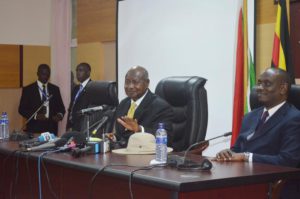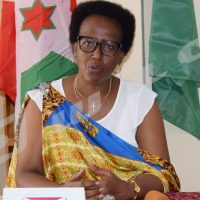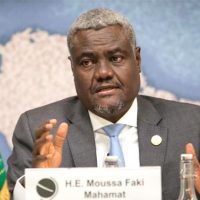Ugandan President Yoweri Museveni, Mediator in Burundi conflict, declared on 14 May that he would highlight the Burundian issue in the upcoming summit of East African Community Heads of State (EAC) scheduled on 20 May 2017. Politicians hope that his firm commitment to end the crisis may accelerate the dialogue process.

Yoweri KagutaMuseveni, Mediator in the Burundian conflict
“We need a consensus on Burundi as a region,” Museveni told New Vision, the Ugandan newspaper.
“When I take the chair in the next EAC summit, I will raise this issue so that we can come to a decision. We should never neglect any opportunity for dialogue. We need to ease tensions with regional players,” said Museveni.
For Tatien Sibomana, a member of the UPRONA party of the opposition, if President Museveni firmly commits to accelerate the inter-Burundi dialogue process, Burundi crisis will end very soon.
“The Ugandan President is one of the co-signatories of the Burundi Arusha Peace Agreement. So, if he pleads with the EAC Heads of State to reach a consensus to get Burundi out of the current political crisis, they will succeed,” says Sibomana.
He says the fact that Museveni is to take the EAC chairmanship in the upcoming summit of EAC Heads of State is also an asset to speed up the dialogue process.
However, Sibomana believes that the dialogue process is challenged by the Burundi ruling party and government that refuse to engage in a dialogue with real opponents accusing them of being coup plotters. He also accuses the EAC Heads of State of contributing to the delay the process.
The EAC Heads of State have shown the willingness to favor the government of Burundi over other parties in conflict. “Whenever the mediation team convenes a summit of these Heads of State, the latter postpone it without a valid reason, which has got the process bogged down,” says Sibomana.
For Sibomana, the issue of identifying participants in Burundi dialogue has not been resolved yet. “The EAC Heads of State and mediation take into consideration the pretexts put forward by the Government of Burundi to boycott the dialogue process, arguing that it cannot negotiate with opponents wanted,” he says.
Sibomana regrets that various resolutions adopted by the United Nations Security Council and the Peace and Security Commission of the African Union have not been implemented. He accuses the EAC Heads of State of hindering the implementation of these resolutions. “The mediation promised that conflicting parties in the Burundi crisis will have reached a compromise by June, I call for more actions than words,” says Sibomana.
The president of RADEBU party, Jean de DieuMutabazi, encourages the mediator in the Burundian conflict to do his best to put an end to the Burundian problem. “We ask him to put forward the interests of the majority of the Burundians,” says Mutabazi.
For him, politicians have participated in various inter-Burundi dialogue sessions and have been able to agree on two points, including the bringing back of the Arusha dialogue to Burundi and the revision of the Constitution. “The mediator must therefore consider the recommendations of the Burundian people,” he says.


















 IWACU Open Data
IWACU Open Data

